Abstract
The database of the U.S. National Toxicology Program has been developed over approximately two decades, principally focused on substances evaluated for carcinogenicity in rodent bioassays. These assays generally provide data on the relative toxicity and carcinogenicity of chemicals based upon discrete subchronic (13 week) and chronic (104 week) exposures. A major value of these data are that the assay protocols, rodent strains, and technical methodologies have been generally consistent, thus permitting comparisons between assays and chemicals. The genotoxicity data for many of the same chemicals have been developed also using standardized biological systems and protocols. Data for assays including mutagenicity in Salmonella and mouse lymphoma cells, chromosomal aberrations, and sister chromatid exchange in Chinese hamster ovary cells, transformation of Balb/c 3T3 cells, and in vivo cytogenetic effects in rodents have been compiled for many chemicals. The results of all of these assays provide a substantial database for evaluating chemical effects and for defining the complex relationships between mutagenicity and carcinogenicity.
Full text
PDF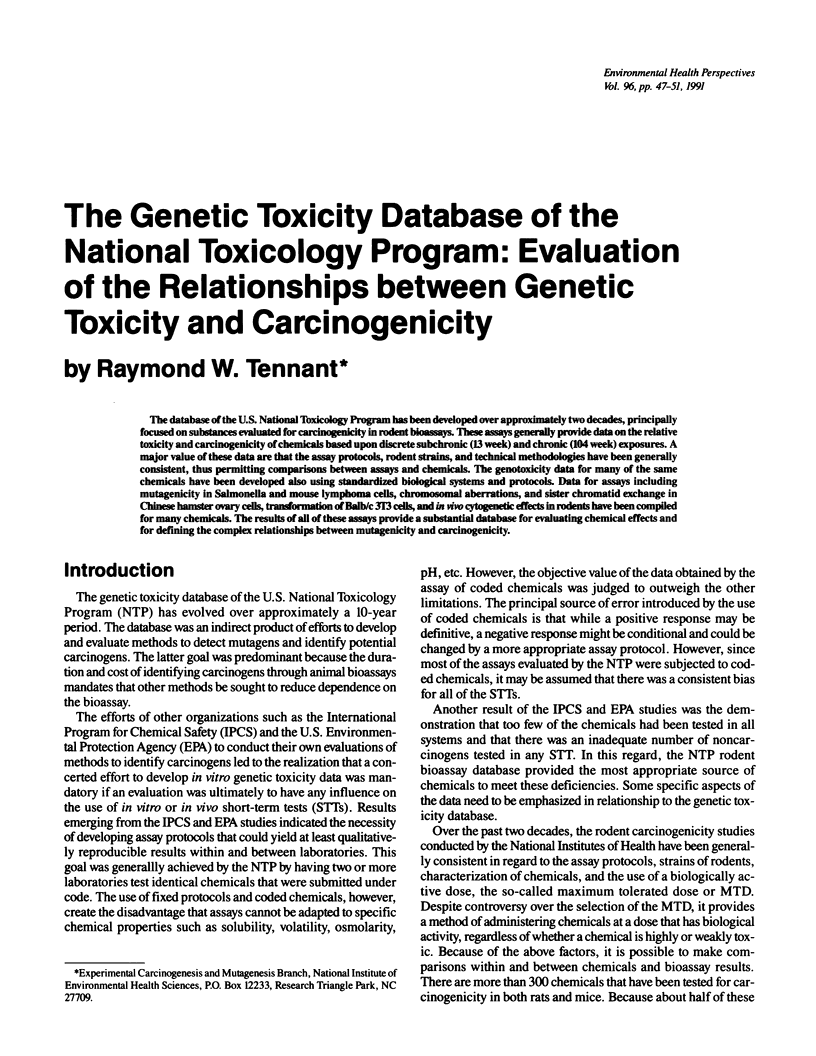
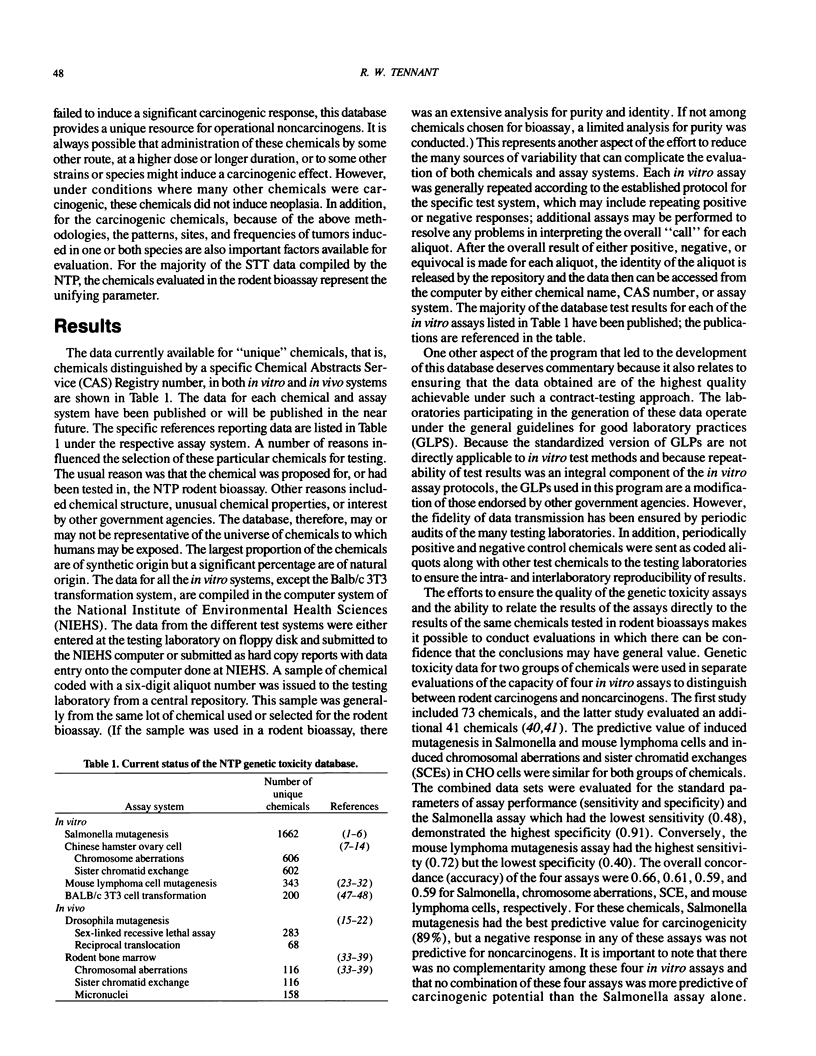
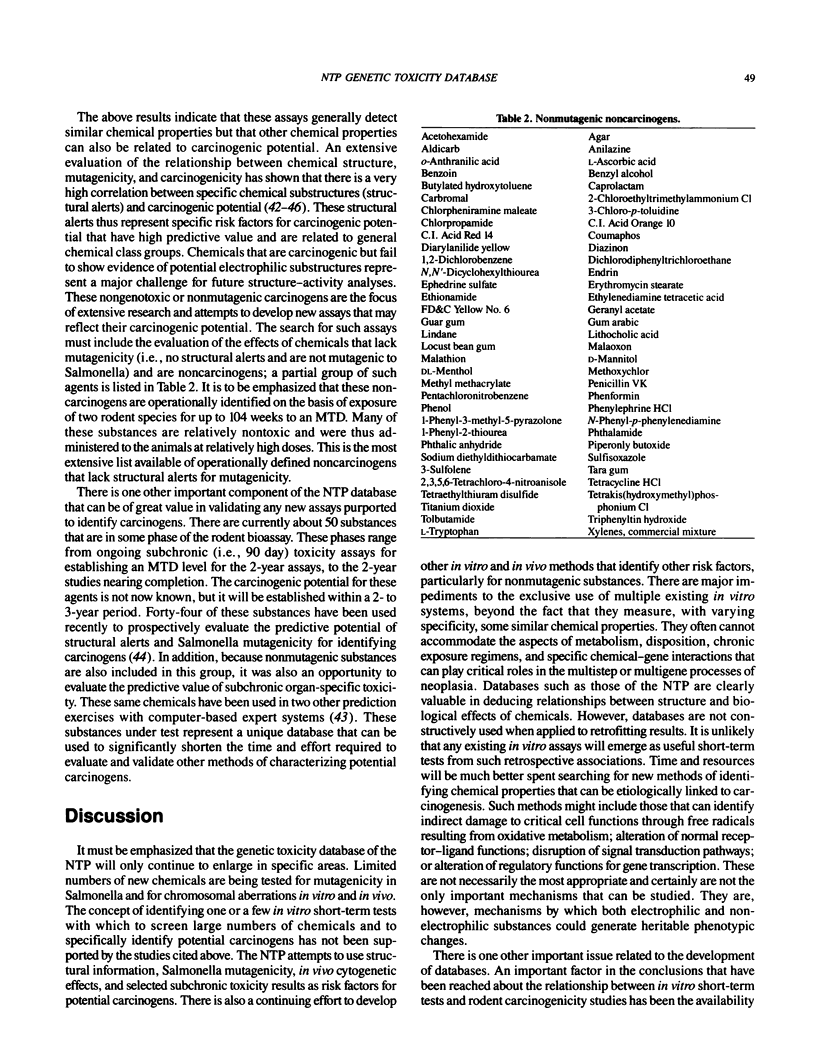
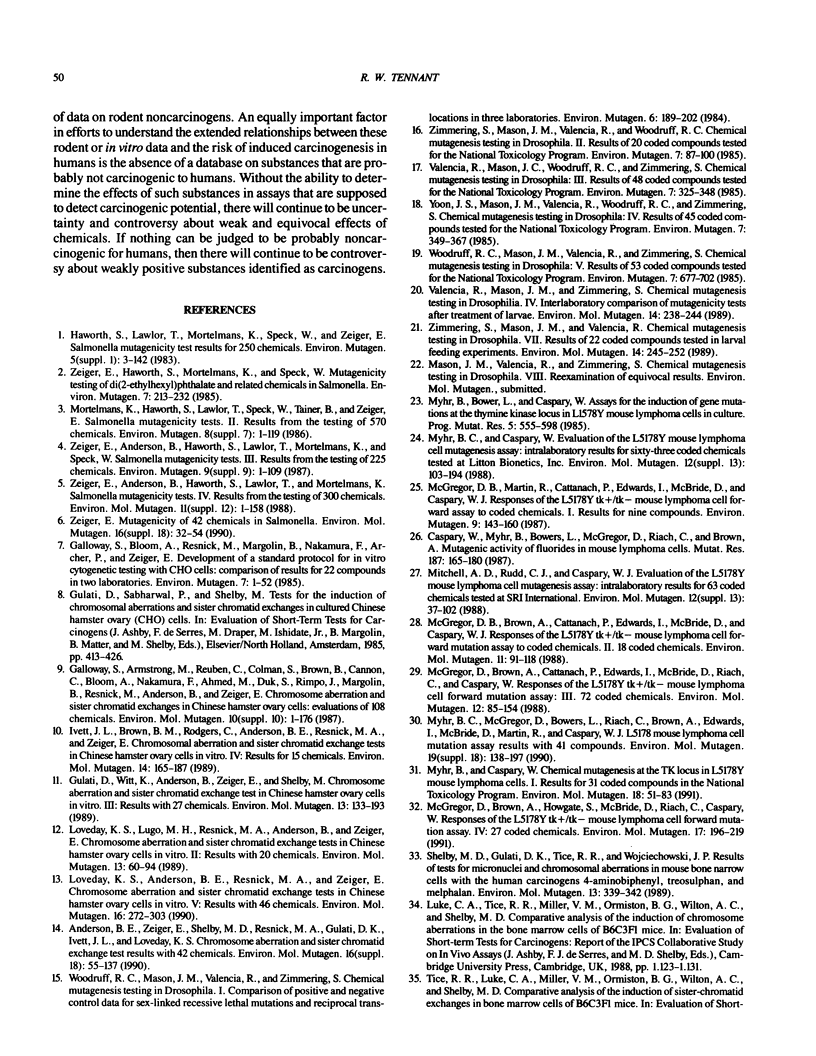
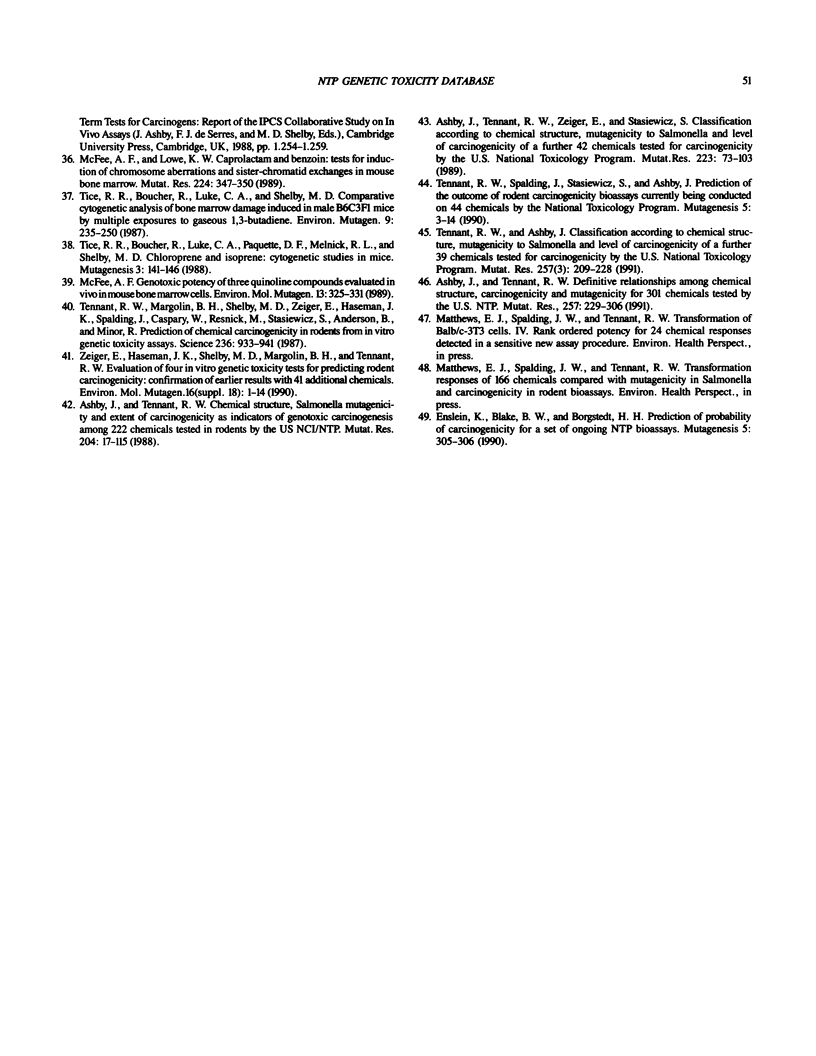
Selected References
These references are in PubMed. This may not be the complete list of references from this article.
- Anderson B. E., Zeiger E., Shelby M. D., Resnick M. A., Gulati D. K., Ivett J. L., Loveday K. S. Chromosome aberration and sister chromatid exchange test results with 42 chemicals. Environ Mol Mutagen. 1990;16 (Suppl 18):55–137. doi: 10.1002/em.2850160505. [DOI] [PubMed] [Google Scholar]
- Ashby J., Tennant R. W. Chemical structure, Salmonella mutagenicity and extent of carcinogenicity as indicators of genotoxic carcinogenesis among 222 chemicals tested in rodents by the U.S. NCI/NTP. Mutat Res. 1988 Jan;204(1):17–115. doi: 10.1016/0165-1218(88)90114-0. [DOI] [PubMed] [Google Scholar]
- Ashby J., Tennant R. W. Definitive relationships among chemical structure, carcinogenicity and mutagenicity for 301 chemicals tested by the U.S. NTP. Mutat Res. 1991 May;257(3):229–306. doi: 10.1016/0165-1110(91)90003-e. [DOI] [PubMed] [Google Scholar]
- Ashby J., Tennant R. W., Zeiger E., Stasiewicz S. Classification according to chemical structure, mutagenicity to Salmonella and level of carcinogenicity of a further 42 chemicals tested for carcinogenicity by the U.S. National Toxicology Program. Mutat Res. 1989 Jun;223(2):73–103. doi: 10.1016/0165-1218(89)90037-2. [DOI] [PubMed] [Google Scholar]
- Caspary W. J., Myhr B., Bowers L., McGregor D., Riach C., Brown A. Mutagenic activity of fluorides in mouse lymphoma cells. Mutat Res. 1987 Mar;187(3):165–180. doi: 10.1016/0165-1218(87)90084-x. [DOI] [PubMed] [Google Scholar]
- Enslein K., Blake B. W., Borgstedt H. H. Prediction of probability of carcinogenicity for a set of ongoing NTP bioassays. Mutagenesis. 1990 Jul;5(4):305–306. doi: 10.1093/mutage/5.4.305. [DOI] [PubMed] [Google Scholar]
- Gulati D. K., Witt K., Anderson B., Zeiger E., Shelby M. D. Chromosome aberration and sister chromatid exchange tests in Chinese hamster ovary cells in vitro. III. Results with 27 chemicals. Environ Mol Mutagen. 1989;13(2):133–193. doi: 10.1002/em.2850130208. [DOI] [PubMed] [Google Scholar]
- Haworth S., Lawlor T., Mortelmans K., Speck W., Zeiger E. Salmonella mutagenicity test results for 250 chemicals. Environ Mutagen. 1983;5 (Suppl 1):1–142. [PubMed] [Google Scholar]
- Ivett J. L., Brown B. M., Rodgers C., Anderson B. E., Resnick M. A., Zeiger E. Chromosomal aberrations and sister chromatid exchange tests in Chinese hamster ovary cells in vitro. IV. Results with 15 chemicals. Environ Mol Mutagen. 1989;14(3):165–187. doi: 10.1002/em.2850140306. [DOI] [PubMed] [Google Scholar]
- Loveday K. S., Anderson B. E., Resnick M. A., Zeiger E. Chromosome aberration and sister chromatid exchange tests in Chinese hamster ovary cells in vitro. V: Results with 46 chemicals. Environ Mol Mutagen. 1990;16(4):272–303. doi: 10.1002/em.2850160409. [DOI] [PubMed] [Google Scholar]
- Loveday K. S., Lugo M. H., Resnick M. A., Anderson B. E., Zeiger E. Chromosome aberration and sister chromatid exchange tests in Chinese hamster ovary cells in vitro: II. Results with 20 chemicals. Environ Mol Mutagen. 1989;13(1):60–94. doi: 10.1002/em.2850130108. [DOI] [PubMed] [Google Scholar]
- McFee A. F., Lowe K. W. Caprolactam and benzoin: tests for induction of chromosome aberrations and SCEs in mouse bone marrow. Mutat Res. 1989 Nov;224(3):347–350. doi: 10.1016/0165-1218(89)90177-8. [DOI] [PubMed] [Google Scholar]
- McGregor D. B., Brown A. G., Howgate S., McBride D., Riach C., Caspary W. J. Responses of the L5178Y mouse Lymphoma cell forward mutation assay. V: 27 coded chemicals. Environ Mol Mutagen. 1991;17(3):196–219. doi: 10.1002/em.2850170309. [DOI] [PubMed] [Google Scholar]
- McGregor D. B., Brown A., Cattanach P., Edwards I., McBride D., Caspary W. J. Responses of the L5178Y tk+/tk- mouse lymphoma cell forward mutation assay. II: 18 coded chemicals. Environ Mol Mutagen. 1988;11(1):91–118. doi: 10.1002/em.2850110110. [DOI] [PubMed] [Google Scholar]
- McGregor D. B., Brown A., Cattanach P., Edwards I., McBride D., Riach C., Caspary W. J. Responses of the L5178Y tk+/tk- mouse lymphoma cell forward mutation assay: III. 72 coded chemicals. Environ Mol Mutagen. 1988;12(1):85–154. doi: 10.1002/em.2860120111. [DOI] [PubMed] [Google Scholar]
- McGregor D. B., Martin R., Cattanach P., Edwards I., McBride D., Caspary W. J. Responses of the L5178Y tk+/tk- mouse lymphoma cell forward mutation assay to coded chemicals. I: Results for nine compounds. Environ Mutagen. 1987;9(2):143–160. doi: 10.1002/em.2860090205. [DOI] [PubMed] [Google Scholar]
- Mitchell A. D., Rudd C. J., Caspary W. J. Evaluation of the L5178Y mouse lymphoma cell mutagenesis assay: intralaboratory results for sixty-three coded chemicals tested at SRI International. Environ Mol Mutagen. 1988;12 (Suppl 13):37–101. doi: 10.1002/em.2860120504. [DOI] [PubMed] [Google Scholar]
- Mortelmans K., Haworth S., Lawlor T., Speck W., Tainer B., Zeiger E. Salmonella mutagenicity tests: II. Results from the testing of 270 chemicals. Environ Mutagen. 1986;8 (Suppl 7):1–119. [PubMed] [Google Scholar]
- Myhr B. C., Caspary W. J. Chemical mutagenesis at the thymidine kinase locus in L5178Y mouse lymphoma cells: results for 31 coded compounds in the National Toxicology Program. Environ Mol Mutagen. 1991;18(1):51–83. doi: 10.1002/em.2850180109. [DOI] [PubMed] [Google Scholar]
- Myhr B. C., Caspary W. J. Evaluation of the L5178Y mouse lymphoma cell mutagenesis assay: intralaboratory results for sixty-three coded chemicals tested at Litton Bionetics, Inc. Environ Mol Mutagen. 1988;12 (Suppl 13):103–194. doi: 10.1002/em.2860120505. [DOI] [PubMed] [Google Scholar]
- Myhr B., McGregor D., Bowers L., Riach C., Brown A. G., Edwards I., McBride D., Martin R., Caspary W. J. L5178Y mouse lymphoma cell mutation assay results with 41 compounds. Environ Mol Mutagen. 1990;16 (Suppl 18):138–167. doi: 10.1002/em.2850160506. [DOI] [PubMed] [Google Scholar]
- Shelby M. D., Gulati D. K., Tice R. R., Wojciechowski J. P. Results of tests for micronuclei and chromosomal aberrations in mouse bone marrow cells with the human carcinogens 4-aminobiphenyl, treosulphan, and melphalan. Environ Mol Mutagen. 1989;13(4):339–342. doi: 10.1002/em.2850130410. [DOI] [PubMed] [Google Scholar]
- Tennant R. W., Ashby J. Classification according to chemical structure, mutagenicity to Salmonella and level of carcinogenicity of a further 39 chemicals tested for carcinogenicity by the U.S. National Toxicology Program. Mutat Res. 1991 May;257(3):209–227. doi: 10.1016/0165-1110(91)90002-d. [DOI] [PubMed] [Google Scholar]
- Tennant R. W., Margolin B. H., Shelby M. D., Zeiger E., Haseman J. K., Spalding J., Caspary W., Resnick M., Stasiewicz S., Anderson B. Prediction of chemical carcinogenicity in rodents from in vitro genetic toxicity assays. Science. 1987 May 22;236(4804):933–941. doi: 10.1126/science.3554512. [DOI] [PubMed] [Google Scholar]
- Tennant R. W., Spalding J., Stasiewicz S., Ashby J. Prediction of the outcome of rodent carcinogenicity bioassays currently being conducted on 44 chemicals by the National Toxicology Program. Mutagenesis. 1990 Jan;5(1):3–14. doi: 10.1093/mutage/5.1.3. [DOI] [PubMed] [Google Scholar]
- Tice R. R., Boucher R., Luke C. A., Paquette D. E., Melnick R. L., Shelby M. D. Chloroprene and isoprene: cytogenetic studies in mice. Mutagenesis. 1988 Mar;3(2):141–146. doi: 10.1093/mutage/3.2.141. [DOI] [PubMed] [Google Scholar]
- Tice R. R., Boucher R., Luke C. A., Shelby M. D. Comparative cytogenetic analysis of bone marrow damage induced in male B6C3F1 mice by multiple exposures to gaseous 1,3-butadiene. Environ Mutagen. 1987;9(3):235–250. doi: 10.1002/em.2860090303. [DOI] [PubMed] [Google Scholar]
- Valencia R., Mason J. M., Woodruff R. C., Zimmering S. Chemical mutagenesis testing in Drosophila. III. Results of 48 coded compounds tested for the National Toxicology Program. Environ Mutagen. 1985;7(3):325–348. doi: 10.1002/em.2860070309. [DOI] [PubMed] [Google Scholar]
- Valencia R., Mason J. M., Zimmering S. Chemical mutagenesis testing in Drosophila. VI. Interlaboratory comparison of mutagenicity tests after treatment of larvae. Environ Mol Mutagen. 1989;14(4):238–244. doi: 10.1002/em.2850140405. [DOI] [PubMed] [Google Scholar]
- Woodruff R. C., Mason J. M., Valencia R., Zimmering S. Chemical mutagenesis testing in Drosophila. V. Results of 53 coded compounds tested for the National Toxicology Program. Environ Mutagen. 1985;7(5):677–702. doi: 10.1002/em.2860070507. [DOI] [PubMed] [Google Scholar]
- Woodruff R. C., Mason J. M., Valencia R., Zimmering S. Chemical mutagenesis testing in Drosophila: I. Comparison of positive and negative control data for sex-linked recessive lethal mutations and reciprocal translocations in three laboratories. Environ Mutagen. 1984;6(2):189–202. doi: 10.1002/em.2860060207. [DOI] [PubMed] [Google Scholar]
- Yoon J. S., Mason J. M., Valencia R., Woodruff R. C., Zimmering S. Chemical mutagenesis testing in Drosophila. IV. Results of 45 coded compounds tested for the National Toxicology Program. Environ Mutagen. 1985;7(3):349–367. doi: 10.1002/em.2860070310. [DOI] [PubMed] [Google Scholar]
- Zeiger E., Anderson B., Haworth S., Lawlor T., Mortelmans K., Speck W. Salmonella mutagenicity tests: III. Results from the testing of 255 chemicals. Environ Mutagen. 1987;9 (Suppl 9):1–109. [PubMed] [Google Scholar]
- Zeiger E., Haseman J. K., Shelby M. D., Margolin B. H., Tennant R. W. Evaluation of four in vitro genetic toxicity tests for predicting rodent carcinogenicity: confirmation of earlier results with 41 additional chemicals. Environ Mol Mutagen. 1990;16 (Suppl 18):1–14. doi: 10.1002/em.2850160502. [DOI] [PubMed] [Google Scholar]
- Zeiger E., Haworth S., Mortelmans K., Speck W. Mutagenicity testing of di(2-ethylhexyl)phthalate and related chemicals in Salmonella. Environ Mutagen. 1985;7(2):213–232. doi: 10.1002/em.2860070209. [DOI] [PubMed] [Google Scholar]
- Zeiger E. Mutagenicity of 42 chemicals in Salmonella. Environ Mol Mutagen. 1990;16 (Suppl 18):32–54. doi: 10.1002/em.2850160504. [DOI] [PubMed] [Google Scholar]
- Zimmering S., Mason J. M., Valencia R. Chemical mutagenesis testing in Drosophila. VII. Results of 22 coded compounds tested in larval feeding experiments. Environ Mol Mutagen. 1989;14(4):245–251. doi: 10.1002/em.2850140406. [DOI] [PubMed] [Google Scholar]
- Zimmering S., Mason J. M., Valencia R., Woodruff R. C. Chemical mutagenesis testing in Drosophila. II. Results of 20 coded compounds tested for the National Toxicology Program. Environ Mutagen. 1985;7(1):87–100. doi: 10.1002/em.2860070105. [DOI] [PubMed] [Google Scholar]


